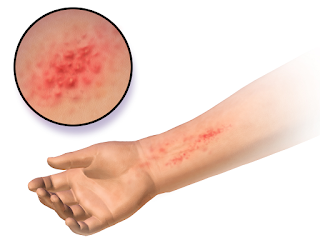Epidemiology
In industrialized countries, in the last thirty years, it has increased from 2 to 3 times. Suffer it from 15 to 30% of children and between 2 to 10% of adults. Many times precedes the appearance of rhinitis and asthma.
It often begins in infancy; the so-called early onset of disease. 45% of cases begins within the first 6 months of birth; 60% is started within the first year and 85% appears before of the 5-year-old. 70% of these children forwards before adolescence. The disease can, also, begin in adulthood; the so-called late onset of illness. 20 to 60% of cases is associated with respiratory manifestations (asma-rinitis)
It often begins in infancy; the so-called early onset of disease. 45% of cases begins within the first 6 months of birth; 60% is started within the first year and 85% appears before of the 5-year-old. 70% of these children forwards before adolescence. The disease can, also, begin in adulthood; the so-called late onset of illness. 20 to 60% of cases is associated with respiratory manifestations (asma-rinitis)
Genetics and environment
The importance of the heritage is evident from the moment in which the twins there are 77% of concordance, while twins, it is 15%.
The influence of the environment, is also significant since it is more common in urban areas than in the rural.
The influence of the environment, is also significant since it is more common in urban areas than in the rural.
Development of atopic dermatitis
The clinical manifestations of atopic dermatitis vary with age; three stages can be considered.
- Childhood; usually, early lesions appear on the cheeks and on the scalp. Scrape that begins within weeks causes crusted erosions.

Atopic Eczema - Childhood; lesions appear in places of Flex skin at the nape of the neck and on the back of the members.
- Adolescence and adulthood; In addition, areas of lichenification which is a thickening of the epidermis with accentuation of the folds of the skin secondary to chronic scratching especially in places of flexion of the elbows and knees and neck. Photo 2 and 3 (Atopic Eczema)
- Pruritus is always very intense. It gets worse at night; It scratches vigorously, even while asleep, which comes to erode the skin, even causing the bleeding. This causes insomnia, tiredness on the day, decrease in school student and labor performance in adults and, consequently, a significant deterioration in their quality of life.
Chronicity
The chronic nature and lack of fully satisfactory therapeutic, make the quality of life of sufferers diminished and this affects not only patients but also their families, since it alters their hours of sleep and therefore his life's relationship, especially in children, from scratching and crying.
The patient should be well aware of the chronic nature of this condition as well as possible adverse effects, in some cases, medication.
The patient should be well aware of the chronic nature of this condition as well as possible adverse effects, in some cases, medication.
Emotional stress
The anguish, frustration and anxiety that sometimes have patients with eczema may aggravate the problem. Family structure can crack if you add family hostility, rejection and guilt. It is therefore important that you and your family understand that such feelings are common and understandable in a chronic disease and must try to overcome them. Do not use this frustration to press on a fast of his eczema 'cure', since this is not possible. Talk, instead, to your doctor about the nature of this chronic disease, factors that can exacerbate it and General measures of treatment. Adopt a positive approach to fight the disease. For this it is important to have a better understanding of the disease and its treatment. The disease can be controlled and patients, above all, the youngest, most get better with the passage of time
Treatment
The treatment will be aimed at improving their quality of life, controlling the itching, improving your rest, moisturizing your skin and preventing infections on added. In addition to medication, indicated by the doctor will, also, be very important the following general steps:
- Bath daily or almost daily, or if there is an acute outbreak, two or three times a week.
- Use a neutral SOAP.
- The bathroom should be brief to being preferable to shower, with quick-drying particularly around the genitals and other skin folds such as the ears, nose, wrists, elbows, English and knees, with immediate lubrication for the skin.
- Use a clean, soft cotton towel; use a different one each day
- Use emollient unscented, such as Vaseline or Glycerin.
- Wear cotton, absorbent and wide. The wool and synthetic material is forbidden. . In the laundry can be any trace of detergent. We should then review with plenty of water to remove it.
- Use cotton sheets.
- Avoid irritants like soaps, detergents, powders, dusts, and cosmetics.
- Use suitable gloves when they handle irritating as solvents, acetone, paint thinner, turpentine, kerosene, alcohol, etc.
- In the washing of clothes may have been some trace of detergent. It should be, then review it with plenty of water to remove it.
- Avoid sweating. In the summer wear wide and in the bedroom, if very hot, air conditioning or fan indirect.
- Avoid contact with mites, so tightly sheaths mattresses and pillows, in a pocket with zip.
- Thoroughly clean the room with vacuum cleaner, at least once a day.
- Wash the blankets with water to 60 degrees, once a month.
You can read another articles like What Is Eczema,
atopic eczema
atopic eczema pictures
atopic eczema treatment
atopic eczema pictures
atopic eczema treatment
No comments:
Post a Comment